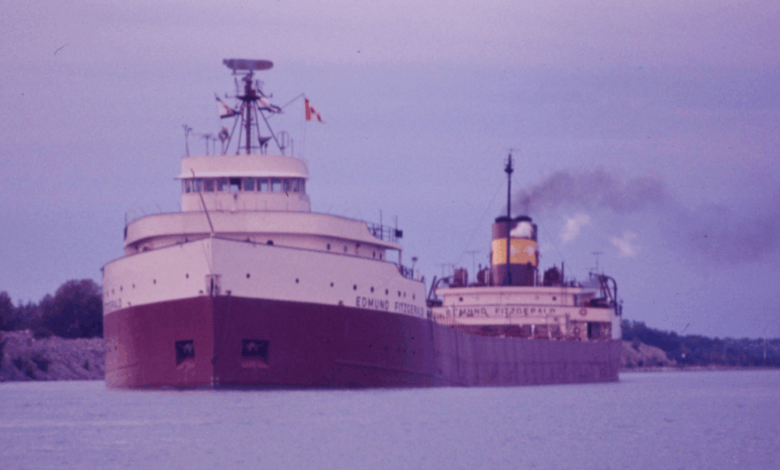The Gales of November Remembered – John G. Grove

On November 10, fifty years ago, “the witch of November came stealing,” breaking apart and sinking the Great Lakes freighter Edmund Fitzgerald on Lake Superior. The ship and all 29 men on board disappeared in one of the fiercest storms of the century without a trace or a final distress call. The poetic description of the storm, of course, is from Gordon Lightfoot’s folk rock ballad that memorialized the wreck and made it part of American cultural consciousness. Without Lightfoot’s unexpected hit, the wreck may be remembered today mainly as a piece of historical trivia, and its anniversary likely would not have been the subject of feature essays and a new book.
“The Wreck of the Edmund Fitzgerald” is not only a fitting remembrance of the men who died in the frigid waters of Lake Superior, but also a searching and haunting reflection on the human condition that conveys the smallness and fragility even of modern man.
In the Romantic idiom, Lightfoot channeled a sense of the sublime. Law & Liberty readers are, of course, familiar with Edmund Burke as a political and constitutional theorist. In his own day, his treatise on aesthetics, A Philosophical Inquiry into the Origin of Our Ideas of the Sublime and Beautiful, was also well-received and often cited. There, he sharply distinguished between beauty and sublimity, and examined the material causes of our sense of each.
The sublime, he argued, springs from our fear of death and desire for self-preservation. Things that would fill us with terror if experienced directly will, when presented artistically from a safe distance, cause a certain kind of delight and wonder. The sublime conveys to us a sense of our own weakness and vulnerability. It silences our reasoning and puts us in awe of what we are beholding.
Shipwreck is, for good reason, a perennial artistic motif, and the prospect of death at sea naturally summons up the emotions appropriate to the sublime. The sea is a restless, boundless, and untamable power, and its seeming infinitude means there is likely no relief to be found should disaster strike. Lightfoot’s ballad makes use of several elements that Burke identified with the sublime: conveying a sense of vastness and infinity; describing great strength and power laid low; and utilizing a “judicious obscurity” in describing the disaster. All of these leave the listener to wonder in awe at what the 29 sailors on board experienced that evening, and to feel our own smallness in the cosmos.
Vastness and Infinity: Perhaps the most immediately recognizable quality of the song is its repetition. The same, simple melody is repeated over and over across seven long verses without a chorus, bridge, or solo. Lightfoot strums the same chords continually on his twelve-string acoustic, accompanied only by an eerie pedal steel guitar, which almost seems to emanate from below the waves. In the opening and in between the verses, the top line is accentuated by an electric guitar, ringing out like a ship’s bell, as if to say, “what has always been here now demands your attention.”
Far from making the song simplistic, though, the repetition serves an essential purpose. Repetition, Burke noted, suggests to us the infinite, just as a continual sound like a pounding hammer seems to continue to echo in our ears even after it is over. Not only does the song’s repetition mimic waves, but by going on and on forever, it conveys a sense of the empty horizon and vastness of the lake—that very quality that makes the shipwreck such an evocative image. To perceive something solid, even at a distance, that we can aim for and take our bearings from is of great comfort, and to lack any such guide is a cause of distress. The song’s lyrics hint at this as the story shifts from the wreck itself to the aftermath:
Does anyone know where the love of God goes
When the waves turn the minutes to hours?
The searchers all say they’d have made Whitefish Bay
If they’d put fifteen more miles behind her
The deep, existential question goes unanswered; the only response is the vain yearning for a safe harbor. If only things had been different … The mention of the safety of the bay comes only after the wreck has taken place, serving merely to accentuate what the sailors did not have. The Fitzgerald was indeed making for Whitefish Bay, but its radar was knocked out, and the radio beacon and light of the bay’s lighthouse were also both dark. The listener must face the storm as the sailors did—with no visible sign of hope.
Along with that sense of the physical vastness of the lake is also a sense of distant time horizons. The lyrics begin not with the ship or its crew or its voyage, but with a legend passed down from generation to generation—“from the Chippewa on down” (inspired by a Newsweek article that had sparked Lightfoot’s imagination). And the ending conveys that the story will remain for time immemorial. What happened on the sea that day, which now captivates us, was but one new part of the legend, only a chapter in the lake’s endless story.
Lightfoot knew he hadn’t written just another ditty. He had penned a chapter in the timeless story of man facing helplessness and mortality.
Power and Weakness: Burke described power as the wellspring of the sublime. “I know of nothing sublime which is not some modification of power.” And a great amplifier of the sublime is to see something great and powerful brought low (as any reader of Shelley’s famous “Ozymandias” knows). “Edmund Fitzgerald” accordingly emphasizes the size and power of the ship in the first two verses. “Bigger than most,” she was the “pride of the American side,” commanded by a “crew and good captain well-seasoned,” and carrying twenty-six thousand tons of iron ore.
It is because the song drives home the strength and size of the ship that its demise becomes not so much an object of pity but of wonder. What power could possibly bring such strength to naught? “That good ship and true was a bone to be chewed.”
Uncertainty: Another way the sublime is summoned by art, Burke said, was through “judicious obscurity.” We fear things that we cannot fully see or understand. “When we know the full extent of any danger, when we can accustom our eyes to it, a great deal of the apprehension vanishes.” Thus, images that are incomplete or difficult to discern leave an impression on our imagination that our reason cannot easily account for. We are left only to stare in wonder at what we cannot fully understand.
Lightfoot often leaves details to the imagination, emphasizing what is not known. As the storm first approaches, it is only a suspicion: “Could it be the north wind they’d been feeling?” It then reveals itself like a phantom, only with “a tattle-tale sound” of the wind whipping the ship’s wires.
The sense of uncertainty, however, is most obvious when it comes to the sinking itself, which is not described at all:
The captain wired in he had water coming in
And the good ship and crew was in peril
And later that night when his lights went out of sight
Came the wreck of the Edmund Fitzgerald.
The listener is suddenly pulled far away from the ship, its captain, crew, and the old cook. He is forced to strain his eyes from a distance to glimpse in the darkness only a dim, faraway light as it disappears into nothing.
What happened, we are not told: “They might have split up or they might have capsized/ They may have broke deep and took water.”
The imprecise depiction of the sinking and aftermath, of course, comports with Lightfoot’s (and our own) limited knowledge of what exactly took place. The image of the lights going out comes from the point of view of the Arthur M. Anderson, which had been trailing behind the Fitzgerald by a few miles, and was the last to see any sign of her. And to this day, it is not known for sure what precisely caused the struggling ship to sink so suddenly. Nevertheless, Lightfoot could have taken artistic license to fill in details. That he chose not to was much to the song’s benefit.
When he first introduces the legend in the opening verse, Lightfoot sings, “The lake it is said never gives up her dead.” By the end, the lake has earned its name: “Superior they said.” Even modern man, who sometimes fancies himself to have “conquered nature,” still cannot claim that title from her.
Almost as famous as the song itself was the reverence that Lightfoot always showed for the story, the victims, and their families. As John U. Bacon recounts in his new book, Lightfoot hesitated even to record it out of fear that he would be seen as an opportunist making money off of tragedy. He had direct contact with many family members, and he refused to ever perform it in a way that might appear flippant.
He knew he hadn’t written just another ditty. He had penned a chapter in the timeless story of man facing his helplessness and mortality. As a remembrance of former things, it was deeply personal to some, and as a remembrance of things to come, it is needful for all.





